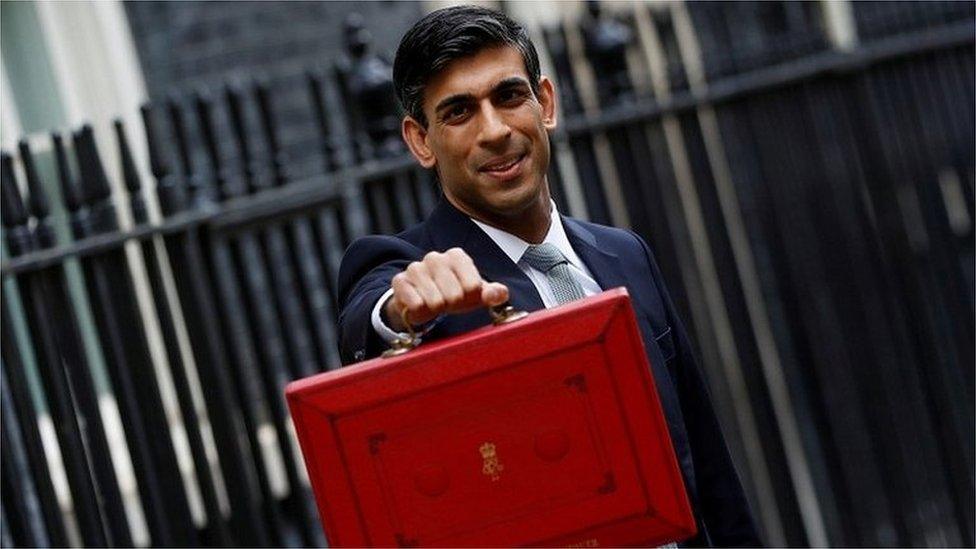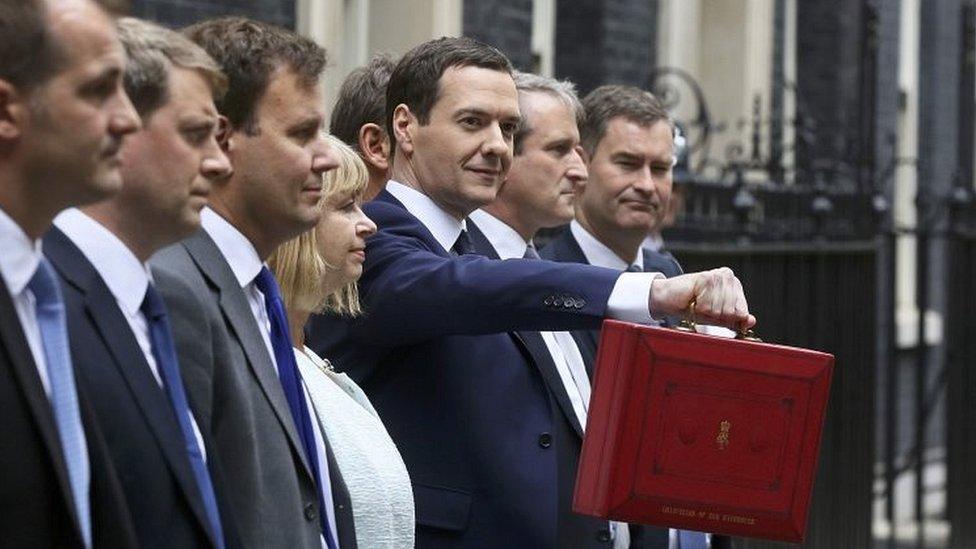Budget: Rishi Sunak set to spend but hopes to return to caution soon
- Published

The never knowingly under-hyped Rishi Sunak will give what he has already described as a "Budget like no other".
The Covid crisis has certainly led him to do things that no other Conservative chancellor has.
The government shut down much of the economy, meaning shops were shuttered, tills were empty, incomes collapsed.
It filled much of the gap with an alphabet soup of what the Treasury would drily term "interventions" - CBILS, CJRS, SEISS, the CCFF, and so on - essentially different ways of filling people's pockets with enormous amounts of cash in a time of crisis.
Alongside that there have been the huge costs of PPE, the test-and-trace programme and vaccines.
No-brainer
Some people, some of the self-employed for example, have not been caught by the safety net stitched together at high speed.
But there is no doubt that it has made a huge difference in the last year. One senior minister, perhaps not that modestly, suggests: "One day we will be through this, and we will look back and realise that we prevented mass unemployment."
There was a feeling at the start of the pandemic that there was no choice. And, with the country still in lockdown, that logic persists.
So, however the chancellor presents his decisions on Wednesday, extending emergency support is a political no-brainer, over which he has simply had not much choice.
And this time, perhaps, he has to get out ahead of the argument, rather than risk being dragged there as schemes get close to their end dates.

George Osborne was a rather different chancellor, at a rather different time
Mr Sunak's warm-up slogan is "We're using the full measure of our fiscal firepower to protect the jobs and livelihoods of the British people".
The Budget won't just be about carrying on the emergency support, however, with a hefty dollop of Brand Sunak, with a TV press conference and sofa chat on Wednesday evening, on top of the traditional red box doorstep and green bench moments.
It will also be about how he hopes to return the Tories to their more traditional trademark - being careful with the country's cash.
There won't be a return to the kind of political argument over the deficit and the debate that David Cameron and George Osborne dominated in the early part of the last decade.
As one Treasury minister said: "Austerity? You just can't do it now." That's partly because the Tories made lots of pricey commitments in their election manifesto, and partly because Boris Johnson is, for a Conservative, a spender not a saver (even hypothetical bridges don't come cheap).
Big borrowing
But the economic conversation is different this time. Interest rates are rock-bottom. Much of the debt the government has run up has been bought by the Bank of England.
And governments around the world have been spending and borrowing eye-watering amounts to get through this emergency. There's a really good explanation of how it all works here.
In short, there isn't unbearable pressure on the chancellor to start saying how, and when, he'll start trying to close the gap between what the government's been spending, and what it takes into its coffers.
And no-one, not even the self-described hawk former Chancellor Lord Hammond, thinks that the overall debt will be paid off for decades.
But, conscious of the Tory trademark, Mr Sunak will start talking about how to start balancing the books too.
There has been a lot of speculation (it's the Budget) about raising taxes, and in particular corporation tax - the tax firms pay on their profits.
That's notable because it would be a reversal of one of his predecessor Mr Osborne's flagship policies.
Tax questions
But also he would face a lot of opposition in his party, and outside, not just on the principle of raising taxes on business from Conservatives, but for doing so during what is still a huge economic emergency.
One prominent economist even told me it was "economically bonkers" to consider raising taxes now, in the hope of then cutting them in a couple of years.
It is indeed, despite public protestations that he hasn't said this to his MPs, at least part of the Treasury's calculation that it would be better to increase taxes soon, to ensure that 2024's is a tax-cutting, pre-election Budget.
One Treasury minister suggests that raising taxes, while also looking like you are concerned with balancing the books in the long term, neutralises Labour: "If we take all the New Labour clothes, where do they go?"
Labour's angst over what to tax and when in the last few days bears some of that out.
But, as with any Budget, the calculations are not just for the carefully choreographed "grid" of announcements and speculation in the run-up to the moment itself, not even for the speech itself and the spreadsheets that get pored over in the hours after, but for setting a path, political and economic, for months - and years - to come.
